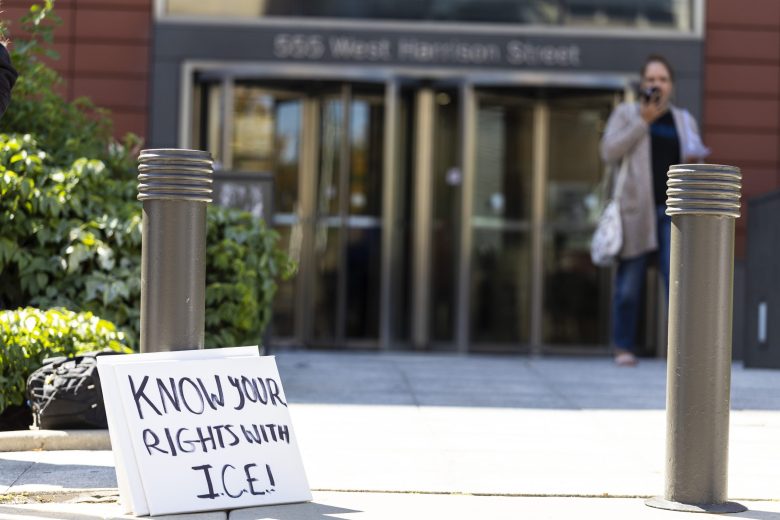Immigration and legal advocates are raising concerns following the recent arrests of two individuals by Immigration and Customs Enforcement (ICE) at a domestic violence court in Cook County, Chicago. The arrests took place during hearings on September 3 and 4, 2025, prompting fears about the impact on vulnerable populations seeking legal protections.
On Tuesday morning, ICE agents apprehended a male defendant after his court hearing, followed by the detention of a woman the next day. Tessa Kuipers, the legal advocacy program director at Family Rescue, reported observing at least four individuals in plain clothes entering the courthouse located at 555 W. Harrison St.. According to Kuipers, these agents did not identify themselves and appeared to be preparing for enforcement actions.
“My staff were calling the survivors who planned to attend court, informing them that ICE was present,” Kuipers stated. “They were allowed to make decisions about what was safest for them based on their documentation status.” ICE has not responded to inquiries regarding the incidents.
The Cook County Sheriff’s Department claimed it was unaware of any ICE presence at the courthouse. Kuipers expressed concern, stating that she had never previously encountered ICE in this setting. In response to the situation, advocates are developing rapid-response plans to address potential future ICE activities, fearing that such actions will deter survivors of domestic violence from seeking help.
“We’re preparing for this to be an ongoing issue,” Kuipers added. “We want to ensure that survivors feel safe to come forward.”
In a proactive measure, a group of approximately ten rapid response workers gathered at the courthouse steps on September 4. They distributed “Know Your Rights” materials to those entering the building and held signs denouncing ICE. Legal aid and domestic violence advocates were also present, actively checking for ICE agents throughout the courthouse.
The Network: Advocating Against Domestic Violence issued a statement condemning the raids, emphasizing that they do not create safety but rather instill fear among survivors. “These actions will undermine survivors’ trust in our legal system and discourage them from coming forward if they fear immigration enforcement will be present,” the statement read.
Concerns have intensified in the city, particularly following President Donald Trump’s announcement of plans to deploy the National Guard to Chicago as part of a crime crackdown. Reports indicate that the Pentagon has designated the Great Lakes Naval Base in North Chicago as a hub for incoming troops and agents. Up to 600 military lawyers are expected to serve as temporary immigration judges in this operation.
Trump reiterated his commitment to sending federal troops to Chicago, stating it was a matter of timing. Governor JB Pritzker indicated that he was informed immigration agents would be prepared for action by September 6, which he believes is strategically timed to coincide with the city’s annual Mexican Independence Day celebrations, raising alarms within Latino communities.
In response to the heightened tensions, Mayor Brandon Johnson announced the expansion of the city’s “Know Your Rights” campaign. This initiative aims to support immigrant, refugee, and mixed-status families in light of increased federal immigration enforcement. The campaign will include a revamped multilingual website, printable preparedness packets, infographics, and weekly workshops with community partners to help families devise safety and communication plans.
“Let’s celebrate strong,” Johnson stated, encouraging Chicagoans to continue their lives amidst the looming threat of immigration raids. He reaffirmed the city’s commitment to protecting the interests of its residents, emphasizing the importance of community solidarity during events like the upcoming Mexican Independence Day parade.
The situation at Cook County’s domestic violence court highlights the ongoing challenges facing immigrant communities in Chicago, particularly those dealing with domestic violence. Advocates continue to work diligently to ensure that survivors feel empowered to seek help and legal protections without the fear of immigration enforcement.
